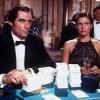Quantum of Solace is not a Bond film to be taken lightly. This is no breezy comedy with big stunts. This is a movie that channels James Bond via John LeCarré for the emotional content—and has much more to do with LeCarré than with Jason Bourne, despite stylistic similarities in the fight sequences.
It is easy to review the surface of a Bond film. The movies are as much about the shiny outer layer (Bond's clothes, his cars, his gadgets, the looks of the women and the looks of Bond himself) as they have ever been about espionage. So let's leave this behind along with camera placement, editing and even cinematography.
This film, as much as any other, shows Bond on a journey, gives him a character arc. So we drop style for content in this review.
Within a few minutes, we find Bond questioning a suspect who likely played a key role in the ultimate suicide of a woman he loved—Vesper—who turned out to be a double agent. M worries Bond is in it not only for Queen and Country, but for revenge. Bond protests, but he clearly has mixed motives. His motives become even more mixed when a mole turns the interrogation into utter chaos.
Bond soon finds himself in an interesting place: He cannot trust MI6 (there could be another mole - and indeed there is, only more highly placed). He finds the CIA cannot be trusted. And worst of all, can he trust that he will act only in the best interest of the greater good? Or will he chose the path that will only lead him to exact his vengeance?
Bond has never been a character for whom introspection sits well. In the novels, his brief looks backwards are bitter, ironic or both. His one memory of childhood detailed in the Fleming canon prompts him to mentally slam the file drawer shut on his past. For better or worse, Bond lives for the present, only significantly haunted by the past in one novel—You Only Live Twice.
So does Bond's emotional journey work in Quantum of Solace? Yes. Bond begins a barely controlled killing machine. He wants blood. He wants to hurt. He is, in this, like America after 9/11. And like America, he finds that death only begets more death, and in a chilling moment, the parallels to the past seven years of geopolitics come home as Bond sees the body of a foot soldier - a beautiful embassy worker in Bolivia whom he has seduced - drowned in oil, oil the West wishes it had. What has all the blood and death (and lust for oil) gotten him or us? Has he come any closer to avenging Vesper's fate? He still seems to care little for the fact that he and another mirror-image revenge-seeker (Camille - an erstwhile secret agent bent on avenging the rape and murder of her family) have uncovered the plot of Dominic Greene to control the water rights in Bolivia. But he believes Greene to be part of the larger organization of color-coded villainy. He does not raise alarms of an impending coup or of his discovery of a giant underground lake filled with the water needed by the choking nation. No, Bond gives only the information he needs to get key facts that will let him and Camille confront those they wish to kill. It's still all about him, all about vengeance.
Yet Bond's taste for death seems to be withering after seeing the trail of bodies continue to lengthen. He advises Camille how best to kill her target, and efficiently eliminates numerous bad men. Yet he stops short with Greene, a man who might be able to lead Bond back to the betraying lover of Vesper. In fact, when faced with the choice of letting Camille burn to death or taking Greene into custody, or more characteristically, killing him, Bond opts for trying to save Camille. When it seems that he will fail, and that she will die the same way she saw her parents die, Bond sees only one solution. In a scene reminiscent of the novel Moonraker, Bond silently prepares to kill Camille out of mercy rather than kill Greene out of vengeance. It is, he seems to feel, the right thing to do, closure to a journey that leads from from suicide to euthanasia with a bullet. Let the villains go, he seems to be saying. Let them chop off their own feet. After hearing that his former comrade—René Mathis—was tortured off of 007s incorrect suspicions, and listening to M tell Mr. White early on that he would likely be whisked off to a country where the niceties of human rights would not be honored, Bond himself may be wondering if, as Mathis comments (via Fleming) that the good guys and bad guys keep getting mixed up. Here Bond prepares to kill as an act of humanity.
Of course, Bond never has to pull that trigger, at least not while the gun is aimed at Camille's head. No, just the act alone seems to bring on heavenly intervention. Bond and Camille live, walking calmly from an inferno into purgatory—she now a wounded survivor who without a reason to kill is in search of a reason to live. Bond tells her to do what they should have done earlier—tell the world about the hidden water. For Bond, he sets Greene to wander the Bolivian desert. In a script device that echoes back to the oil crisis of the 70s, Bond gives Greene only oil to sustain him — something the more caustic and jingoistic Westerners declared should be the fate of the OPEC Ministers during the Arab oil embargo. The can of motor oil is a death sentence issued by 007, although one filled with irony—his own government, so hungry for oil, was perfectly willing to let Bolivians die of thirst. Is the oil can offered to Greene a warning to Downing Street and Washington D.C.? Are those who live for oil destined to die for it? When asked about the oil, Bond simply says to M later, "I can't help you." Is this his way to say he won't use his licence to kill to help feed the oil lust of America and Europe? Is it significant that he earlier drove off into the sunset in a hydrogen-powered vehicle from an exploding hydrogen-powered hotel? Regardless, too many have died in distant deserts so we can pump oil into engines, and there can be no mistaking the symbolism here.
Yet Bond has one more demon to face—Vesper's lover. Having sought this never-seen target through hell and back (literally) Bond finally faces the seedy man in a cheap apartment in Russia. Left alone by M and guards, Bond contemplates what to do with his power to play God. In 1962, Sean Connery barely lifted an eyebrow as he shot Prof. Dent in the back, changing the history of cinema in the process. Here, we do not see what Bond does, but we know he has learned that killing will not salve his grief, only mourning will. And, possibly, 007 realizes that choosing not to kill may be the greatest power of all. He tells M. she was right about Vesper, presumably about her being the driving force behind his actions. He realizes that he must once and for all let Vesper go in order to both be human and to be the cold, inhuman thing he must remain to do his job. And from seeing the way his government and the CIA view the world, he knows that someone must be there to be, if not a blunt instrument, at least a clear-eyed servant of the moral universe we wish to preserve.
And is this, too, the journey the US and UK are in the process of taking? Has the hollow taste of vengeance finally turned into a quest for something more? Has our licence to kill failed to quench our thirst for justice? Bond, at the end seems to have found something more while looking down the gun at his last potential victim. This is a film about thirst - thirst for oil, thirst for water, and thirst for solace—the greatest thirst of all. And this is something Bond finds, ultimately, by not firing his gun.
I can't wait to see where Bond may travel next.
Keep dancing...
Edited by Bonita, 17 November 2008 - 08:05 AM.




